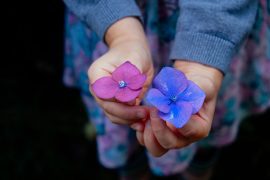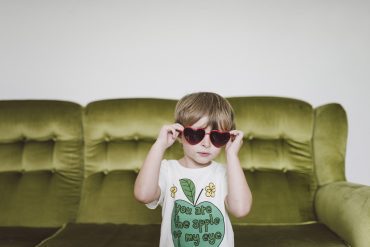- We prioritize a deep nurturing connection. Babies grow the neural wiring to soothe themselves by being soothed by their parents. But even older children need to feel connected to us or they can’t regulate themselves emotionally. When we notice our child getting dysregulated, the most important thing we can do (after calming ourselves) is to try to reconnect. When kids feel that we’re on their side, even when we need to say no to them, they WANT to cooperate – so that warm, delighted connection eliminates a lot of “misbehavior”.
- We accept our child’s feelings, even when they’re inconvenient (as feelings often are). “Oh, Sweetie, I know that’s disappointing…I’m so sorry things didn’t work out the way you wanted.” When empathy becomes our “go to” response, our child learns that emotions may not feel good, but they’re not dangerous, so she accepts and processes them as they come up, instead of stuffing them, where they just get uglier. She knows someone understands, so she doesn’t have to yell to be heard. And when our support helps her learn that she can live through bad feelings and the sun will come out the next day, she begins to develop resilience.
- We guide behavior but resist the urge to punish. Spankings, time outs, consequences, and shaming don’t give kids the help they need with their emotions. In fact, the message kids get is that the emotions that drove them to “misbehave” are bad. So kids try to repress those emotions, and their emotional backpack gets stuffed even more full of bad feelings. That’s one of the reasons that punishment actually leads to more misbehavior – those feelings keep bubbling up out of the emotional backpack looking for healing, and your child lashes out because the emotions feel so scary. Instead of punishing, help your child stay on track with loving guidance and emotion coaching to help them process emotions.
- We limit our child’s actions as necessary, even while we help the child feel safe enough to feel the emotions. Of course your child isn’t yet capable of making all his own decisions in life, even when he’s thinking well. When he’s angry, it’s not surprising that he does and says things he’ll be sorry for later (don’t you?). Your angry child is not a bad person, but a hurting, very young human. When kids aren’t controlling their emotions, it’s because they can’t, at that moment. This is not the time to teach him not to be rude. If you can stay compassionate, your child will feel safe enough to surface, feel and express the tears and fears that are driving his anger and acting out. If you can help him feel safe enough to actually feel those tears and fears, they’ll evaporate – and the anger and acting out will vanish, too.
- We act like the grown-up. When we aren’t able to take charge in our home, setting appropriate limits and creating a positive tone, kids don’t feel safe. They worry that we aren’t able to meet their emotional needs, so they start working hard to take charge themselves. That’s one reason children get bossy and demanding. Even worse for their development, they stop coming to us with their tears and fears. They don’t trust us with their vulnerability. They have to keep their defenses up, so they develop a chip on their shoulder. And that means they can’t relax and tackle things that scare them (otherwise known as age-appropriate developmental tasks), like learning to work out conflicts with peers and taking the risk of trying new things. The solution is to this “attitude” is to help the child feel safe, by committing to being a calm, emotionally generous parent who sets empathic limits and models emotional intelligence.
Kids who are parented this way learn to “control” their emotions because they have a healthy emotional life, not because they’ve been told not to feel, or punished or shamed for their feelings. They learn that:
- Emotions aren’t bad, they’re just part of the richness of being human.When you allow yourself to feel, the emotions begin to fade away.
- We don’t usually have a choice about what we feel, but we always have a choice about how we choose to act.
Does this demand a lot of the parent? Absolutely! But what better motivation to grow than your love for your child?
And if you’re still working on regulating yourself, you’ll be glad to hear that your kids will almost certainly be better at managing their emotions than you are. Why? You’re doing the hard work now to help them learn how. And most of the work – surprise! – is on yourself.
Find the original here.
Dr. Laura Markham, founder of AhaParenting.com and author of Peaceful Parent, Happy Kids, Peaceful Parent, Happy Siblings and her latest book, the Peaceful Parent, Happy Kids Workbook.










